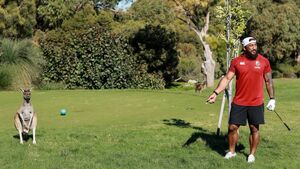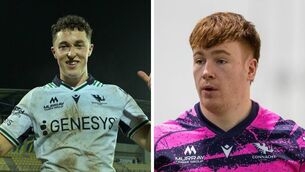Lions doing a roaring trade off the pitch

Connacht and Ireland's Bundee Aki had company on the green during the British & Irish Lions Golf Day in Joondalup Resort, Perth, Australia last Thursday. Picture: INPHO/Dan Sheridan
A report, released last week, revealed that golf tourism is worth some €717 million to the Irish economy each year. The industry supports over 15,500 jobs, which is a staggering figure when you consider Ireland is a relatively small country. Given the quality of our courses, and the attraction to those from overseas to sample the unique nature of links golf in particular, it appears the revenue generated by the sport will only continue to grow into the future.
It is reflective of the powerful nature of sport when it comes to being an economic driver – and it’s particularly pertinent in a summer when the Lions, or the British and Irish Lions to give them their full title, are touring Australia.
The Lions, as a concept, has managed to retain its sense of prestige, even in a sporting landscape that has changed utterly since the idea’s inception all the way back in 1888, when the side was known as ‘Shaw and Shrewsbury’.
The fact that even in the professional era, when players are being pulled from pillar to post with club and international commitments, the Lions has held onto its place in the calendar is an achievement in itself.
Something that also stands out about the Lions, though, is the commercial power of the entity and how important it is for the four unions involved.
In Dublin, in the lead up to the opening match of the tour against Argentina at the Aviva Stadium, it was impossible to escape, or not notice, the sheer amount of Lions supporters around the city. The vast majority had come in from the UK and there were thousands donning the distinctive red Lions kit as they made their way around our capital.
The match itself, on the Friday night, was a sell-out, which again underlined the ability of rugby to attract people to fixtures that, all things considered, don’t have a whole lot riding on them.
It prompted a look at just how much money the Lions generates – and the figures lay bare just how successful a financial endeavour the Lions has become.
In 2017, when the Lions toured New Zealand, the company made a £7.1 million (sterling) profit from revenue of £22.1 million, which by any stretch is a highly impressive return. Even more impressive are the figures related the 2021 tour to South Africa. In spite of it happening during the pandemic – and there being no crowds at the three Test matches – the Lions still managed to generate revenue of £20.1 million at the end of 2021, and made a profit of £8.2 million pounds.
Much of that was down to its association with up to 25 commercial partners for that tour to South Africa, which included the likes of Vodafone, DHL and British Airways.
Some estimates suggest that, for the first time, the tour to Australia this summer will break the £10 million barrier in profits for the first time. And, as part of that, the players are each set to receive around €100,000 in fees for making the tour, which is also a record.
Even for the current tour, a glance at the Lions website shows just how well they are doing in attracting sponsors to the table. Patron Saint has become the official whiskey supplier to the Lions, Talksport is the ‘exclusive audio broadcast partner’ and Dove Men+ Care has become the personal care product of choice for both the Lions and the Wallabies.
While we haven’t quite reached that stage yet, it’s hard to ever imagine a situation where a GAA team will have an official whiskey supplier. They might come in useful, though, the Monday after a big championship win!
Nonetheless, one has to admire the Lions’ ability to create something big and sustainable out of an event that happens once every four years, and spends so much time of the limelight outside of tour years. The prestige and tradition endures and so too does the Lions.
And, perhaps, that’s part of the attraction. Much like the Ryder Cup in golf, there is a sense of tradition about the Lions. The way in which they go about their business – both literally and metaphorically – is shrewd and sensible and helps the unions get the best possible return on the tour every four years.
Media helps, of course, and Sky Sports, despite opting to shelve much of their rugby commitments, remains a key driver of the tour with wide-ranging coverage in the lead-in and during the tour itself.
One of the main things that has helped to create the sense of importance around the Lions, aside from its place and tradition in rugby itself, is the way in which it has been broadcast. The 1997 tour, documented in ‘Living with the Lions’, is often viewed as the benchmark when it comes to sports documentaries.
In teaming up with a production company to help produce in-house content on YouTube this time around, the Lions have shown an aptitude to move with the times to ensure they stay relevant and grab as many eyeballs as they can, while they can.
In terms of a sporting endeavour, the Lions has always been a success. Players want to play, coaches want to be involved and there’s a sense of something special about it all. That is something money can’t buy. But, the commercial side of things has become a roaring success. And that, in a modern landscape, is more important than ever.
The Lions have managed to find the perfect sweet spot.



